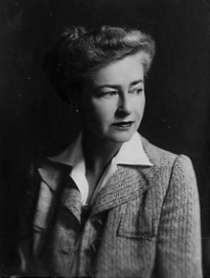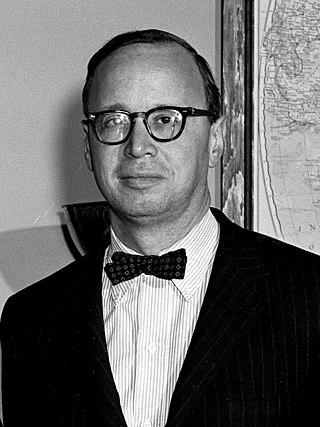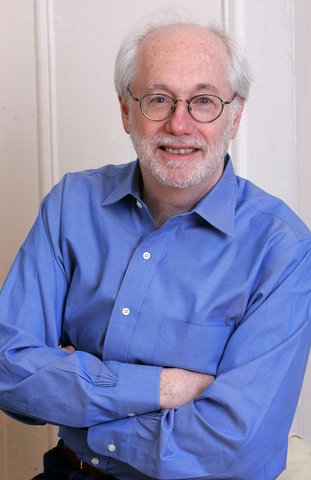
The Pulitzer Prizes are 23 annual awards given by Columbia University in New York for achievements in the United States in "journalism, arts and letters." They were established in 1917 by the will of Joseph Pulitzer, who had made his fortune as a newspaper publisher.

William McKinley was the 25th president of the United States, serving from 1897 until his assassination in 1901. A member of the Republican Party, he led a realignment that made Republicans largely dominant in the industrial states and nationwide for decades. He presided over victory in the Spanish–American War of 1898; gained control of Hawaii, Puerto Rico, Guam, and the Philippines; restored prosperity after a deep depression; rejected the inflationary monetary policy of free silver, keeping the nation on the gold standard; and raised protective tariffs.

Edward Franklin Albee III was an American playwright known for works such as The Zoo Story (1958), The Sandbox (1959), Who's Afraid of Virginia Woolf? (1962), A Delicate Balance (1966), and Three Tall Women (1994). Some critics have argued that some of his work constitutes an American variant of what Martin Esslin identified as and named the Theater of the Absurd. Three of his plays won the Pulitzer Prize for Drama and two of his other works won the Tony Award for Best Play.

The Pulitzer Prize for History, administered by Columbia University, is one of the seven American Pulitzer Prizes that are annually awarded for Letters, Drama, and Music. It has been presented since 1917 for a distinguished book about the history of the United States. Thus it is one of the original Pulitzers, for the program was inaugurated in 1917 with seven prizes, four of which were awarded that year. The Pulitzer Prize program has also recognized some historical work with its Biography prize, from 1917, and its General Non-Fiction prize, from 1962.

The Pulitzer Prize for Biography is one of the seven American Pulitzer Prizes annually awarded for Letters, Drama, and Music. The award honors "a distinguished and appropriately documented biography by an American author." Award winners received $15,000 USD.

The Pan-American Exposition was a World's Fair held in Buffalo, New York, United States, from May 1 through November 2, 1901. The fair occupied 350 acres (0.55 sq mi) of land on the western edge of what is now Delaware Park, extending from Delaware Avenue to Elmwood Avenue and northward to Great Arrow Avenue. It is remembered today primarily for being the location of the assassination of United States President William McKinley at the Temple of Music on September 6, 1901. The exposition was illuminated at night. Thomas A. Edison, Inc. filmed it during the day and a pan of it at night.

The Armada is a popular history by Garrett Mattingly—a historian who taught at Columbia University—about the attempt of the Spanish Armada to invade England in 1588. It was published in 1959 by Houghton Mifflin Company, and Mattingly won a special Pulitzer Prize for the work in 1960 as "a first class history and a literary work of high order." It was published in the UK in the same year by Jonathan Cape under the title The Defeat of the Spanish Armada.

Margaret Kernochan Leech, also known as Margaret Pulitzer, was an American historian and fiction writer. She won the Pulitzer Prize for History both in 1942 and in 1960.

Arthur Meier Schlesinger Jr. was an American historian, social critic, and public intellectual. The son of the influential historian Arthur M. Schlesinger Sr. and a specialist in American history, much of Schlesinger's work explored the history of 20th-century American liberalism. In particular, his work focused on leaders such as Harry S. Truman, Franklin D. Roosevelt, John F. Kennedy, and Robert F. Kennedy. In the 1952 and 1956 presidential campaigns, he was a primary speechwriter and adviser to the Democratic presidential nominee, Adlai Stevenson II. Schlesinger served as special assistant and "court historian" to President Kennedy from 1961 to 1963. He wrote a detailed account of the Kennedy administration, from the 1960 presidential campaign to the president's state funeral, titled A Thousand Days: John F. Kennedy in the White House, which won the 1966 Pulitzer Prize for Biography or Autobiography.
Carl Neumann Degler was an American historian and Pulitzer Prize-winning author. He was the Margaret Byrne Professor of American History Emeritus at Stanford University.
The following are the Pulitzer Prizes for 1942.
The following are the Pulitzer Prizes for 1960.
Arthur Clarence Walworth was an American writer and biographer. Of his works from the 1930s to 1980s, Walworth wrote two books on Woodrow Wilson. As part of a 1958 two volume biography on Wilson, Walworth received the Pulitzer Prize for Biography or Autobiography in 1959 with Woodrow Wilson: American Prophet. His other book on Wilson was Wilson and his Peacemakers in 1986. Other topics Walworth wrote on were about Matthew C. Perry and a timeline between World War I and the Paris Peace Conference. Apart from writing, Walworth edited and sold academic works for Houghton Mifflin Company between the late 1920s to early 1940s. He also worked with the United States Office of War Information in 1943.

William McKinley, the 25th president of the United States, was shot on the grounds of the Pan-American Exposition in the Temple of Music in Buffalo, New York, on September 6, 1901, six months into his second term. He was shaking hands with the public when an anarchist, Leon Czolgosz, shot him twice in the abdomen. McKinley died on September 14 of gangrene caused by the wounds. He was the third American president to be assassinated, following Abraham Lincoln in 1865 and James A. Garfield in 1881.

The presidency of William McKinley began on March 4, 1897, when William McKinley was inaugurated and ended September 14, 1901, upon his assassination. A longtime Republican, McKinley is best known for conducting the successful Spanish–American War (1898), freeing Cuba from Spain; taking ownership of the Republic of Hawaii; and purchasing the Philippines, Guam and Puerto Rico. It includes the 1897 Dingley Tariff which raised rates to protect manufacturers and factory workers from foreign competition, and the Gold Standard Act of 1900 that rejected free silver inflationary proposals. Rapid economic growth and a decline in labor conflict marked the presidency and he was easily reelected. He was succeeded by Vice President Theodore Roosevelt following his death.
Megan Marshall is an American scholar, writer, and biographer.

David Nasaw is an American author, biographer and historian who specializes in the cultural, social and business history of early 20th Century America. Nasaw is on the faculty of the Graduate Center of the City University of New York, where he is the Arthur M. Schlesinger Jr. Professor of History.

Abraham Lincoln: The War Years encompasses volumes three through six of Carl Sandburg's six-volume biography of Abraham Lincoln; these volumes focus particularly on the American Civil War period. The first two volumes, Abraham Lincoln: The Prairie Years, were published in 1926 and cover the period from Lincoln's birth through his inauguration as president. The final four volumes were published together in 1939, and won the 1940 Pulitzer Prize for History.
Between Riverside and Crazy is a 2014 play by playwright, screenwriter, director, and actor Stephen Adly Guirgis. The play won the 2015 Pulitzer Prize for Drama, the 2015 New York Drama Critics Circle Award for Best Play, the 2015 Lucille Lortel Award for Outstanding Play, the 2015 Outer Critics Circle Award for Outstanding New Off-Broadway Play and the 2015 Off Broadway Alliance Award for Best New Play.
Reveille in Washington, 1860–1865 is a nonfiction history book by American historian Margaret Leech. It won the 1942 Pulitzer Prize for History. After being out of print for years, it was reissued by New York Review Books in 2011 with an introduction by James M. McPherson, author of the Pulitzer Prize-winning book Battle Cry of Freedom (1988).













